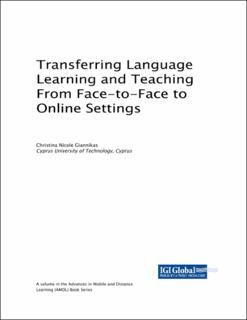| dc.contributor.author | Giannikas, Christina Nicole | |
| dc.contributor.author | Tsagari, Dina | |
| dc.contributor.author | Liontou, Trisevgeni | |
| dc.date.accessioned | 2023-03-08T08:08:30Z | |
| dc.date.available | 2023-03-08T08:08:30Z | |
| dc.date.created | 2022-01-19T22:51:57Z | |
| dc.date.issued | 2022 | |
| dc.identifier.isbn | 9781799887171 | |
| dc.identifier.isbn | 9781799887188 | |
| dc.identifier.isbn | 9781799887195 | |
| dc.identifier.uri | https://hdl.handle.net/11250/3056905 | |
| dc.description.abstract | The abrupt shift to online learning and teaching shocked the majority of the language education community who had to become familiar with online tools, resources, and adjust their teaching approaches overnight. Beyond the state of alarm, it is now evident that a nexus between innovation and ICT exists. The pandemic has highlighted the critical role of technology in language education. As part of a larger study, this chapter focuses on language education in Cyprus and examines the issues facing language teachers’ digital literacy and competence through the lens of complex and unpredictable adaptive systems. The data displayed and discussed in the chapter contradicts teachers’ confidence of their digital literacy and competence of delivering language lessons online and what was applied in practice, and concludes by making specific recommendations at policy making, pedagogical, and research levels. | en_US |
| dc.language.iso | eng | en_US |
| dc.publisher | IGI Global | en_US |
| dc.relation.ispartof | Transferring Language Learning and Teaching from Face-to-Face to Online Settings | |
| dc.title | Digital Literacy in Language Education: The COVID-19 era of Cyprus | en_US |
| dc.type | Chapter | en_US |
| dc.type | Peer reviewed | en_US |
| dc.description.version | publishedVersion | en_US |
| dc.rights.holder | © 2022 by IGI Global | en_US |
| cristin.ispublished | true | |
| cristin.fulltext | original | |
| cristin.qualitycode | 1 | |
| dc.identifier.doi | https://doi.org/10.4018/978-1-7998-8717-1.ch010 | |
| dc.identifier.cristin | 1985529 | |
| dc.source.pagenumber | 189-202 | en_US |
